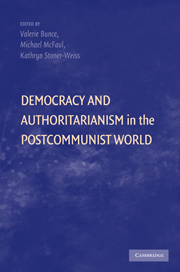Book contents
- Frontmatter
- Contents
- Prologue
- PART I WAVES OF REGIME CHANGE: FROM DICTATORSHIP TO DEMOCRACY…AND BACK?
- PART II ENCOURAGING DEMOCRACY: THE ROLE OF THE EUROPEAN UNION
- PART III CHOOSING REGIME CHANGE: DEMOCRATIZING ELECTIONS
- 5 A Postcommunist Transition in Two Acts
- 6 Defining and Domesticating the Electoral Model
- 7 Georgia's Rose Revolution
- 8 Importing Revolution
- PART IV RESISTING REFORM: BACKSLIDING DEMOCRACIES AND ENDURING AUTOCRACIES
- Epilogue
- Index
- References
6 - Defining and Domesticating the Electoral Model
A Comparison of Slovakia and Serbia
Published online by Cambridge University Press: 05 June 2012
- Frontmatter
- Contents
- Prologue
- PART I WAVES OF REGIME CHANGE: FROM DICTATORSHIP TO DEMOCRACY…AND BACK?
- PART II ENCOURAGING DEMOCRACY: THE ROLE OF THE EUROPEAN UNION
- PART III CHOOSING REGIME CHANGE: DEMOCRATIZING ELECTIONS
- 5 A Postcommunist Transition in Two Acts
- 6 Defining and Domesticating the Electoral Model
- 7 Georgia's Rose Revolution
- 8 Importing Revolution
- PART IV RESISTING REFORM: BACKSLIDING DEMOCRACIES AND ENDURING AUTOCRACIES
- Epilogue
- Index
- References
Summary
A key theme in this book is that the spread of democracy in postcommunist Europe and Eurasia over the past two decades has taken place through two successive waves of political change that, although differing from one another in certain respects, share nonetheless one overarching commonality: a convergence between international and domestic support for democratic development. The initial wave of democratic change in this region took place as communism and communist states were unraveling from 1989 to 1992, and it rested on the deployment of several approaches to breaking with authoritarian rule and building democratic orders – in particular, large-scale protests against communism and in support of democracy and/or the formation of pacts between authoritarians and democrats in order to guide a transition to democratic politics. This initial round of democratic change, although far from fully regional in its reach, generated nonetheless fully democratic polities in seven of the twenty-seven countries that made up the region at the time: Poland, Hungary, the Czech Republic, Slovenia, and the Baltic states. What advantaged these countries in particular with respect to democratization was the distinctive character of their communist-era legacies, that is, the ability of citizens and oppositions in these contexts to capitalize on the development during communism of a strong liberal (and often nationalist) opposition and the formation of a popular consensus around three key issues: rejection of the communist model of politics and economics, substitution of liberal political and economic regimes for this model, and integration with Western economic, political, and security institutions.
- Type
- Chapter
- Information
- Democracy and Authoritarianism in the Postcommunist World , pp. 134 - 154Publisher: Cambridge University PressPrint publication year: 2009
References
- 1
- Cited by



